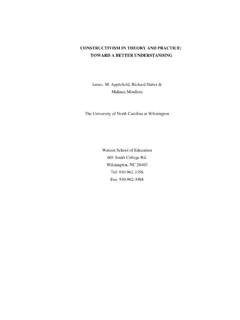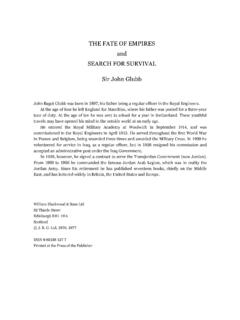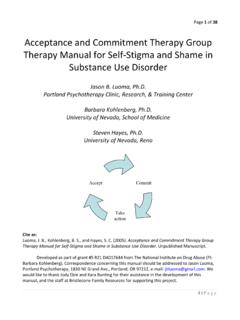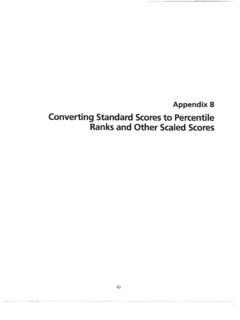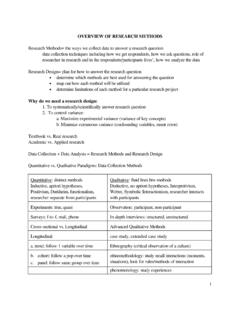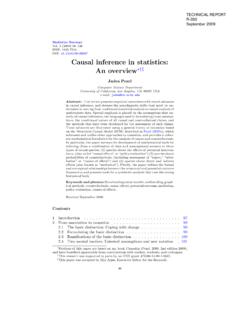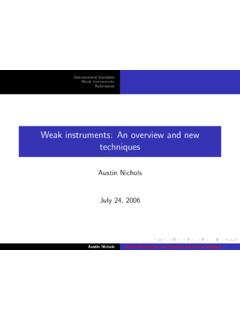Transcription of Overview of Non-experimental Methods
1 1 Non-experimental Methods Overview of Non-experimental Methods . Case Studies. Qualitative Research. Field Studies. Internal & External Validity. Manipulation & Constraint. Phenomenology. Archival Studies. Assignment #7: An Observational Study. Why use Non-experimental research Methods ? Overview of Non-experimental Methods1. Experimentation is not feasible or desirable." Non-experimental Methods " refers to a group of descriptive/observational research techniques that, while unable to clearlyestablish cause-and-effect, can nevertheless reveal important aspectsof thought, behavior, & social To test a hypothesis in a real-world To learn (gather data) about real-worldphenomena, prior to developing more maturetheories & primary Non-experimental Methods are Phenomenology,Case Studies, Field Studies, Archival Studies, Qualitative Studies, andSurveys & Interviews.
2 In addition to Quantitative data, Non-experimentalmethods often use some form of Qualitative data. QuantitativeData. numbers assigned to observations; data analysis andconclusions based on means,SDs, etc. Many research projects in Psych use a combination ofQuantitative and Qualitative data. QualitativeData. observations described in words; data analysis andconclusions based on verbal reports, descriptions, etc. rarely used alone in Psychology; more often usedalone in Sociology, Education, & of Non-experimental Methods2 A major issue in the choice between experimental & Non-experimental Methods concerns Internal of Non-experimental Methods Internal Validity.
3 The degree to which a research design allows you tomake causal statements (or draw firm conclusions). Internal validity is generally high in experimentalstudies but lower in Non-experimental studies. External Validity. The degree to which research findings generalize topeople or situations outside the research setting. External validity is often thought to be high in Non-experimental studies & lower in experimental studies. All Methods can be described along 2 of Manipulation of Antecedents (Control)DegreeofImpositionofUnits(Const raintsonResponding)LowMediumHighLowMediu mHighTrueExperimentsNon-ExperimentalRese archOverview of Non-experimental Methods Has other problems including (a) accuracy &objectivity; (b) replication; (c) generalization; and(d) providing causal Describing & analyzing one'ssubjective experience.
4 Related toIntrospection("arm-chair" psychology). May often involve little manipulation of antecedentsor constraints on responding. However, the use ofphenomenology (subjective experience) may notalways be so (see next slide). Has a major inherent problem (that is neverthelesstheoretically interesting): Trying to observe yourown experience likely alters that Remember/Know Procedure "Remember"Judgment. "Make this response if you canrecollect the detailssurrounding the test item's prior presentation; what yousaw, heard, felt, or were thinking about at the time.
5 " "Know"Judgment. "Make this response if the test item isfamiliar, you know itwas presented, but you can't recollect any specific detailsabout its prior presentation."Used in memory research to measure the different kindsof subjective experience that accompany remembering. Set-up: Subjects study a list of items (words, faces, etc.) and thenare given a recognition test; for each test item the subject thinksthey studied, they are to respond "Remember" or "Know".Effect of Age on Remember/Know JudgmentsParkin& Walter (1992) Main problems are with (a) replication and (b) abilityto generalize to Studies An intensive investigation of one individual.
6 Used for a variety of purposes including: May often involve little manipulation of antecedentsor constraints on responding. However, this is notalways the case, esp. when case studies are used totest accepted ideas or (see next slide). studying rare phenomena. development & initial testing of new hypotheses,theories, or therapies. testing or disproving ideas, theories, or StudiesPatient : Unable to identify common objects (visualagnosia) but can draw them from memoryTennis racket called a "Fencer's Mask"Dart called a "Feather Duster".Case StudiesPatient : Unable to identify common objects (visualagnosia) but can draw them from memoryField StudiesField studies are observations or experiments conductedoutside of the lab, in real-world settings ('in the field').
7 Two general categories of Field Studies:Naturalistic Observation& Participant-Observation. In both cases, there is little or no manipulation ofantecedent conditions; and little or no constraint onhow "participants" respond. A major concern in field studies (any study thatinvolves one person observing another) isReactivity:The tendency of a person or animal to alter theirbehavior when they are (aware of) being watched. Because of this, field researchers often conceal theirpresence; or augment their study withunobtrusivemeasures(such as thelost-letter technique).
8 5 Field Studies Naturalistic Observation. observing & recording behaviors as they occurspontaneously in real-world settings & situations*. often used to study animals in the wild, mother-childinteractions*, organizations, and in market research. Often uses techniques for theSystematic Recordingof relevant events: Frequency Method: Counting instances of behavior X. Duration Method: Recording how long behavior X lasts. Time Sampling: Only making observations during aspecific period of time ( , watch 30s, record 30s). Event Sampling: Only counting behavior of type X.
9 Individual Sampling: Only watching person Studies Participant-Observation. actually becoming part of the group you're studying. used to investigate groups that (a) are difficult to studywith traditional Methods ; (b) are expected to show highreactivity; or (c) would not give consent to be gangsUFO CultsRadical GroupsOverweightElderly Numerous records can be used includingcensus data, library records, consumerrecords, sports stats, crime rates, website hits, Studies Examples of research using archival data include: Relation between race and sports- related violence( , getting hit by a pitch in MLB: Timmerman, 2002).
10 Whether Black (vs. White) uniforms lead to greateraggression in sports (Frank &Gilovitch, 1998).Archival studies use existing records toinvestigate a novel issue. Examining societal changes in the perception ofbeauty or criminality, the size or layout of housing, etc. Can be a part of anexpt'alstudy or Involves examination of verbal reports("content analysis") rather than quantitative Studies Two major drawbacks to qualitative research:(1) the difficulty of verbal analysis; (2) the fact thatself-reports are open to many self-reports (about thoughts, opinions, feelings,memories, etc.)
